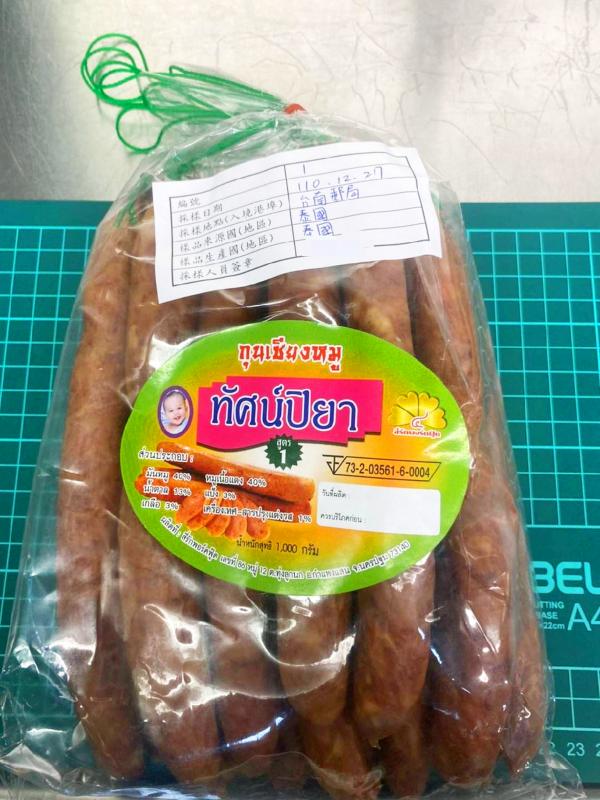Migrant workers who are caught illegally importing meat products from areas affected by African swine fever or receive such products without notifying the authorities would be fined, have their employment permits revoked and be deported, the Ministry of Labor said in a statement on Friday.
Taiwan has been on alert as international deliveries have been found to contain meat products that tested positive for African swine fever, the ministry said.
A package from Thailand was flagged by a post office in Tainan on Dec. 15 last year after it was found to contain sausages. A lab test on Dec. 17 found that the sausages contained the virus.

Photo courtesy of the Bureau of Animal and Plant Health Inspection and Quarantine via CNA
The initial result was confirmed by a test conducted by the Council of Agriculture on Dec. 22.
With the Lunar New Year holiday approaching, the ministry reminded migrant workers not to illegally import meat products, buy such products from unknown origins online, or ask friends or family members to send them to Taiwan.
People who are found to have illegally imported such products face a jail term of up to seven years and a fine of up to NT$3 million (US$108,342), it said.
Any parcels containing meat products sent by family or friends overseas should be given to the Bureau of Animal and Plant Health Inspection and Quarantine or a local animal protection office to be destroyed, the ministry said, adding that breaches would result in fines of up to NT$150,000 based on the Employment Service Act (就業服務法).
The government might also revoke an offender’s employment permit, ask them to leave the country and bar them from working in Taiwan, it said.
The ministry also reminded employers to inform their foreign staff about African swine fever prevention laws and regulations.
Employers should also ensure that food waste from migrant workers’ dormitories is not sent to pig farms, the ministry said.
African swine fever is not known to infect humans, but can be fatal to pigs, and an outbreak might devastate the country’s high-value pig farming industry.
The law requires kitchen waste to be steam-heated at no less than 90°C for about an hour to kill the virus.
On Aug. 23, Kaohsiung police seized 40 packages of shredded chicken and 20 packages of beef jerky, weighing 17kg in total, from the dorm room of a Vietnamese migrant worker. The shredded chicken later tested positive for African swine fever.
A week earlier, 71kg of illegally imported meat products from Vietnam were seized in New Taipei City. They were later also found to contain the virus.
Migrant workers who have questions about African swine fever should call the 1955 counseling and protection hotline, the ministry said.

NATIONAL SECURITY THREAT: An official said that Guan Guan’s comments had gone beyond the threshold of free speech, as she advocated for the destruction of the ROC China-born media influencer Guan Guan’s (關關) residency permit has been revoked for repeatedly posting pro-China content that threatens national security, the National Immigration Agency said yesterday. Guan Guan has said many controversial things in her videos posted to Douyin (抖音), including “the red flag will soon be painted all over Taiwan” and “Taiwan is an inseparable part of China,” while expressing hope for expedited “reunification.” The agency received multiple reports alleging that Guan Guan had advocated for armed reunification last year. After investigating, the agency last month issued a notice requiring her to appear and account for her actions. Guan Guan appeared as required,

A strong cold air mass is expected to arrive tonight, bringing a change in weather and a drop in temperature, the Central Weather Administration (CWA) said. The coldest time would be early on Thursday morning, with temperatures in some areas dipping as low as 8°C, it said. Daytime highs yesterday were 22°C to 24°C in northern and eastern Taiwan, and about 25°C to 28°C in the central and southern regions, it said. However, nighttime lows would dip to about 15°C to 16°C in central and northern Taiwan as well as the northeast, and 17°C to 19°C elsewhere, it said. Tropical Storm Nokaen, currently

PAPERS, PLEASE: The gang exploited the high value of the passports, selling them at inflated prices to Chinese buyers, who would treat them as ‘invisibility cloaks’ The Yilan District Court has handed four members of a syndicate prison terms ranging from one year and two months to two years and two months for their involvement in a scheme to purchase Taiwanese passports and resell them abroad at a massive markup. A Chinese human smuggling syndicate purchased Taiwanese passports through local criminal networks, exploiting the passports’ visa-free travel privileges to turn a profit of more than 20 times the original price, the court said. Such criminal organizations enable people to impersonate Taiwanese when entering and exiting Taiwan and other countries, undermining social order and the credibility of the nation’s

‘SALAMI-SLICING’: Beijing’s ‘gray zone’ tactics around the Pratas Islands have been slowly intensifying, with the PLA testing Taiwan’s responses and limits, an expert said The Ministry of National Defense yesterday condemned an intrusion by a Chinese drone into the airspace of the Pratas Islands (Dongsha Islands, 東沙群島) as a serious disruption of regional peace. The ministry said it detected the Chinese surveillance and reconnaissance drone entering the southwestern parts of Taiwan’s air defense identification zone early yesterday, and it approached the Pratas Islands at 5:41am. The ministry said it immediately notified the garrison stationed in the area to enhance aerial surveillance and alert levels, and the drone was detected in the islands’ territorial airspace at 5:44am, maintaining an altitude outside the effective range of air-defense weaponry. Following